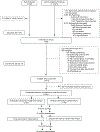Harvest for Health, a Randomized Controlled Trial Testing a Home-Based, Vegetable Gardening Intervention Among Older Cancer Survivors Across Alabama: An Analysis of Accrual and Modifications Made in Intervention Delivery and Assessment During COVID-19
- PMID: 35533876
- PMCID: PMC10656755
- DOI: 10.1016/j.jand.2022.05.005
Harvest for Health, a Randomized Controlled Trial Testing a Home-Based, Vegetable Gardening Intervention Among Older Cancer Survivors Across Alabama: An Analysis of Accrual and Modifications Made in Intervention Delivery and Assessment During COVID-19
Abstract
Background: Accelerated functional decline is a concern among older cancer survivors that threatens independence and quality of life. Pilot studies suggest that vegetable gardening interventions ameliorate functional decline through improved diet and physical activity.
Objective: The aim of this article was to describe the rationale, recruitment challenges, and enrollment for the Harvest for Health randomized controlled trial (RCT), which will test the impact of a home-based, vegetable gardening intervention on vegetable and fruit consumption, physical activity, and physical functioning among older cancer survivors. Modifications made to the intervention and assessments to assure safety and continuity of the RCT throughout the COVID-19 pandemic also are reported.
Design: Harvest for Health is a 2-year, 2-arm, single-blinded, wait-list controlled RCT with cross-over.
Participants/setting: Medicare-eligible survivors of cancers with ≥60% 5-year survival were recruited across Alabama from October 1, 2016 to February 8, 2021.
Intervention: Participants were randomly assigned to a wait-list control or a 1-year home-based gardening intervention and individually mentored by extension-certified master gardeners to cultivate spring, summer, and fall vegetable gardens.
Main outcome measures: Although the RCT's primary end point was a composite measure of vegetable and fruit consumption, physical activity, and physical functioning, this article focuses on recruitment and modifications made to the intervention and assessments during COVID-19.
Statistical analyses performed: χ2 and t tests (α < .05) were used to compare enrolled vs unenrolled populations.
Results: Older cancer survivors (n = 9,708) were contacted via mail and telephone; 1,460 indicated interest (15% response rate), 473 were screened eligible and consented, and 381 completed baseline assessments and were randomized. Enrollees did not differ from nonrespondents/refusals by race and ethnicity, or rural-urban status, but comprised significantly higher numbers of comparatively younger survivors, those who were female, and survivors of breast cancer (P < .001). Although COVID-19 delayed trial completion, protocol modifications overcame this barrier and study completion is anticipated by June 2022.
Conclusions: This RCT will provide evidence on the effects of a mentored vegetable gardening program among older cancer survivors. If efficacious, Harvest for Health represents a novel, multifaceted approach to improve lifestyle behaviors and health outcomes among cancer survivors-one with capacity for sustainability and widespread dissemination.
Trial registration: ClinicalTrials.gov NCT02985411.
Keywords: Cancer; Diet; Older adults; Physical activity; Physical function; Survivorship.
Copyright © 2022 Academy of Nutrition and Dietetics. Published by Elsevier Inc. All rights reserved.
Conflict of interest statement
Figures



Similar articles
-
Vegetable Gardening and Health Outcomes in Older Cancer Survivors: A Randomized Clinical Trial.JAMA Netw Open. 2024 Jun 3;7(6):e2417122. doi: 10.1001/jamanetworkopen.2024.17122. JAMA Netw Open. 2024. PMID: 38900426 Free PMC article. Clinical Trial.
-
Pilot Randomized Controlled Trial of a Home Vegetable Gardening Intervention among Older Cancer Survivors Shows Feasibility, Satisfaction, and Promise in Improving Vegetable and Fruit Consumption, Reassurance of Worth, and the Trajectory of Central Adiposity.J Acad Nutr Diet. 2018 Apr;118(4):689-704. doi: 10.1016/j.jand.2017.11.001. Epub 2018 Jan 2. J Acad Nutr Diet. 2018. PMID: 29305129 Free PMC article. Clinical Trial.
-
A home-based mentored vegetable gardening intervention demonstrates feasibility and improvements in physical activity and performance among breast cancer survivors.Cancer. 2018 Aug;124(16):3427-3435. doi: 10.1002/cncr.31559. Epub 2018 Jun 22. Cancer. 2018. PMID: 29932460 Free PMC article. Clinical Trial.
-
Acceptability and Feasibility of Community Gardening Interventions for the Prevention of Non-Communicable Diseases among Indigenous Populations: A Scoping Review.Nutrients. 2023 Feb 3;15(3):791. doi: 10.3390/nu15030791. Nutrients. 2023. PMID: 36771495 Free PMC article.
-
A Scoping Review to Explore the Potential Benefits of Nutrition Interventions for Latino/a Adult Cancer Survivors in the US.Nutrients. 2023 Nov 29;15(23):4963. doi: 10.3390/nu15234963. Nutrients. 2023. PMID: 38068821 Free PMC article.
Cited by
-
Nutrition and Exercise Knowledge, Attitude, and Practice: A Scoping Review of Assessment Questionnaires in Cancer Survivorship.Nutrients. 2025 Apr 23;17(9):1412. doi: 10.3390/nu17091412. Nutrients. 2025. PMID: 40362721 Free PMC article.
-
Harvest for health in survivors of chronic disease: A demonstration project in the Alabama Black Belt and Mississippi Delta Region.Transl Behav Med. 2024 Feb 7;14(2):127-137. doi: 10.1093/tbm/ibad062. Transl Behav Med. 2024. PMID: 37824851 Free PMC article.
-
Dietary Supplement Use among Older Cancer Survivors: Socio-Demographic Associations, Supplement Types, Reasons for Use, and Cost.Nutrients. 2022 Aug 18;14(16):3402. doi: 10.3390/nu14163402. Nutrients. 2022. PMID: 36014907 Free PMC article.
-
Vegetable Gardening and Health Outcomes in Older Cancer Survivors: A Randomized Clinical Trial.JAMA Netw Open. 2024 Jun 3;7(6):e2417122. doi: 10.1001/jamanetworkopen.2024.17122. JAMA Netw Open. 2024. PMID: 38900426 Free PMC article. Clinical Trial.
-
Adaptation and study protocol for harvest for health together Arizona: A mentored community garden intervention for survivors of cancer.Contemp Clin Trials Commun. 2024 Mar 28;39:101290. doi: 10.1016/j.conctc.2024.101290. eCollection 2024 Jun. Contemp Clin Trials Commun. 2024. PMID: 38595771 Free PMC article.
References
-
- Miller KD, Nogueira L, Mariotto AB, et al. Cancer treatment and survivorship statistics, 2019. CA Cancer J Clin 2019; 69(5): 363–385. - PubMed
-
- Institute of Medicine and National Research Council. From Cancer Patient to Cancer Survivors: Lost in Transition. Washington, DC: National Academies Press, 2005.
-
- Travis LB, Demark Wahnefried W, Allan JM, et al. Aetiology, genetics and prevention of secondary neoplasms in adult cancer survivors. Nature reviews Clinical oncology 2013; 10: 289–301. - PubMed

